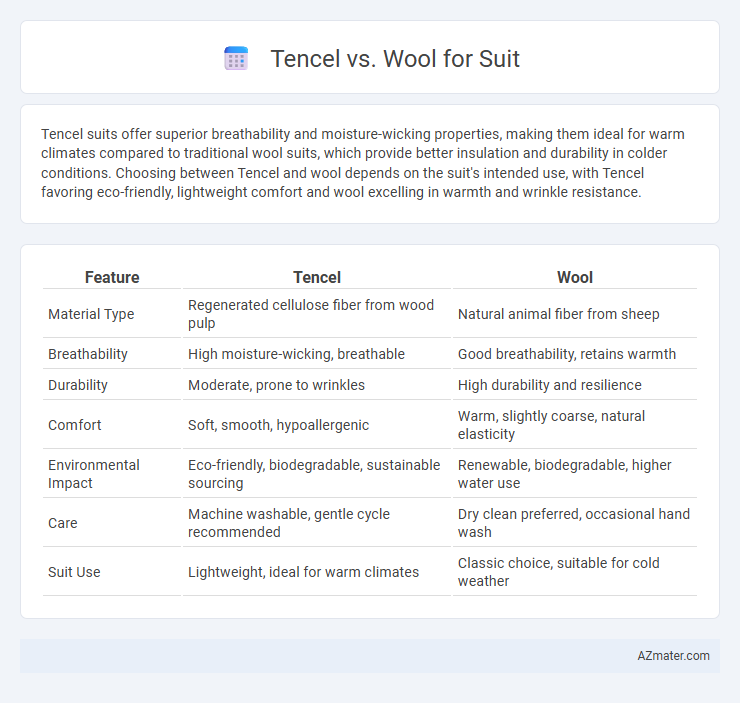Tencel suits offer superior breathability and moisture-wicking properties, making them ideal for warm climates compared to traditional wool suits, which provide better insulation and durability in colder conditions. Choosing between Tencel and wool depends on the suit's intended use, with Tencel favoring eco-friendly, lightweight comfort and wool excelling in warmth and wrinkle resistance.
Table of Comparison
| Feature | Tencel | Wool |
|---|---|---|
| Material Type | Regenerated cellulose fiber from wood pulp | Natural animal fiber from sheep |
| Breathability | High moisture-wicking, breathable | Good breathability, retains warmth |
| Durability | Moderate, prone to wrinkles | High durability and resilience |
| Comfort | Soft, smooth, hypoallergenic | Warm, slightly coarse, natural elasticity |
| Environmental Impact | Eco-friendly, biodegradable, sustainable sourcing | Renewable, biodegradable, higher water use |
| Care | Machine washable, gentle cycle recommended | Dry clean preferred, occasional hand wash |
| Suit Use | Lightweight, ideal for warm climates | Classic choice, suitable for cold weather |
Introduction to Tencel and Wool Fabrics
Tencel, a sustainable fabric derived from eucalyptus wood pulp, offers exceptional breathability, moisture-wicking properties, and a soft, smooth texture ideal for lightweight suits. Wool, a natural protein fiber from sheep, is renowned for its durability, insulation, and wrinkle resistance, making it a classic choice for tailored suits across seasons. Both materials provide unique benefits, with Tencel excelling in eco-friendliness and comfort, while wool delivers warmth and structure.
Sustainability and Environmental Impact
Tencel fibers, derived from sustainably managed eucalyptus trees, require less water and energy compared to traditional wool production, significantly reducing environmental impact and carbon footprint. Wool, while biodegradable and renewable, often involves higher methane emissions from sheep and intensive land use, impacting biodiversity. Choosing Tencel suits promotes lower water consumption and fewer greenhouse gases, whereas wool offers natural insulation but may involve more resource-intensive animal farming practices.
Comfort and Breathability Comparison
Tencel suits offer superior breathability and moisture-wicking properties, making them ideal for warm climates and all-day comfort. Wool suits provide excellent temperature regulation through natural insulation and breathability, suitable for varied weather conditions and maintaining comfort in cooler environments. Both fibers are soft, but Tencel's smooth texture reduces skin irritation, while wool's natural crimp enhances airflow and durability.
Durability and Longevity
Tencel suits offer moderate durability with strong resistance to wrinkles and moisture, making them suitable for regular wear, but they may show signs of wear faster than wool. Wool suits are highly durable and boast excellent longevity due to natural resilience, elasticity, and resistance to pilling, making them a preferred choice for long-lasting formalwear. The natural fibers in wool provide superior abrasion resistance compared to Tencel, ensuring suits maintain their structural integrity over extended periods.
Maintenance and Care Requirements
Tencel suits require low maintenance, as the fabric is naturally wrinkle-resistant, moisture-wicking, and machine washable, making it easy to care for with minimal effort. Wool suits demand more attention, typically requiring dry cleaning, careful storage, and protection from moths to preserve their shape and texture. Regular brushing and airing out wool garments help maintain fabric quality and longevity, while Tencel's durability reduces the risk of shrinkage or damage from washing.
Look, Texture, and Drape
Tencel suits offer a smooth, lustrous appearance with a silky texture that drapes softly, providing a modern and sleek silhouette. Wool suits boast a natural matte finish with a slightly coarse texture that can vary from fine to heavy, creating structured, tailored drapes that hold shape well. Both fabrics allow for excellent breathability, but Tencel tends to resist wrinkles better while wool provides superior insulation and a classic, timeless look.
All-Weather Suit Performance
Tencel offers excellent moisture-wicking properties and breathability, making it ideal for warm and humid conditions in an all-weather suit. Wool provides natural insulation and temperature regulation, keeping you comfortable in cooler climates while still breathable enough for mild weather. Combining both materials in a suit optimizes durability, temperature control, and comfort across diverse weather conditions.
Price and Cost Efficiency
Tencel suits generally offer a more affordable price point compared to wool suits, making them a cost-effective choice for budget-conscious buyers. Wool, especially high-quality variants like Merino or worsted wool, tends to have a higher initial cost but provides superior durability and natural breathability, which can lower long-term garment replacement expenses. Choosing Tencel suits maximizes savings upfront while wool suits may deliver better cost efficiency over time due to enhanced fabric resilience and timeless style retention.
Suitability for Different Occasions
Tencel suits offer breathability and moisture-wicking properties, making them ideal for warm-weather events and casual business settings. Wool suits provide superior insulation and a classic, structured look suited for formal occasions and cooler climates. Choosing between Tencel and wool depends on the event's formality, temperature, and desired comfort level.
Final Verdict: Which Fabric Is Better for Suits?
Tencel suits offer superior moisture-wicking and breathability, making them ideal for warm climates and active wearers seeking comfort and sustainability. Wool suits provide excellent insulation, wrinkle resistance, and durability, maintaining a classic look suited for formal settings and cooler weather. Choosing between Tencel and wool ultimately depends on climate needs and performance preferences, with wool favored for traditional elegance and Tencel praised for eco-friendly comfort.

Infographic: Tencel vs Wool for Suit
 azmater.com
azmater.com